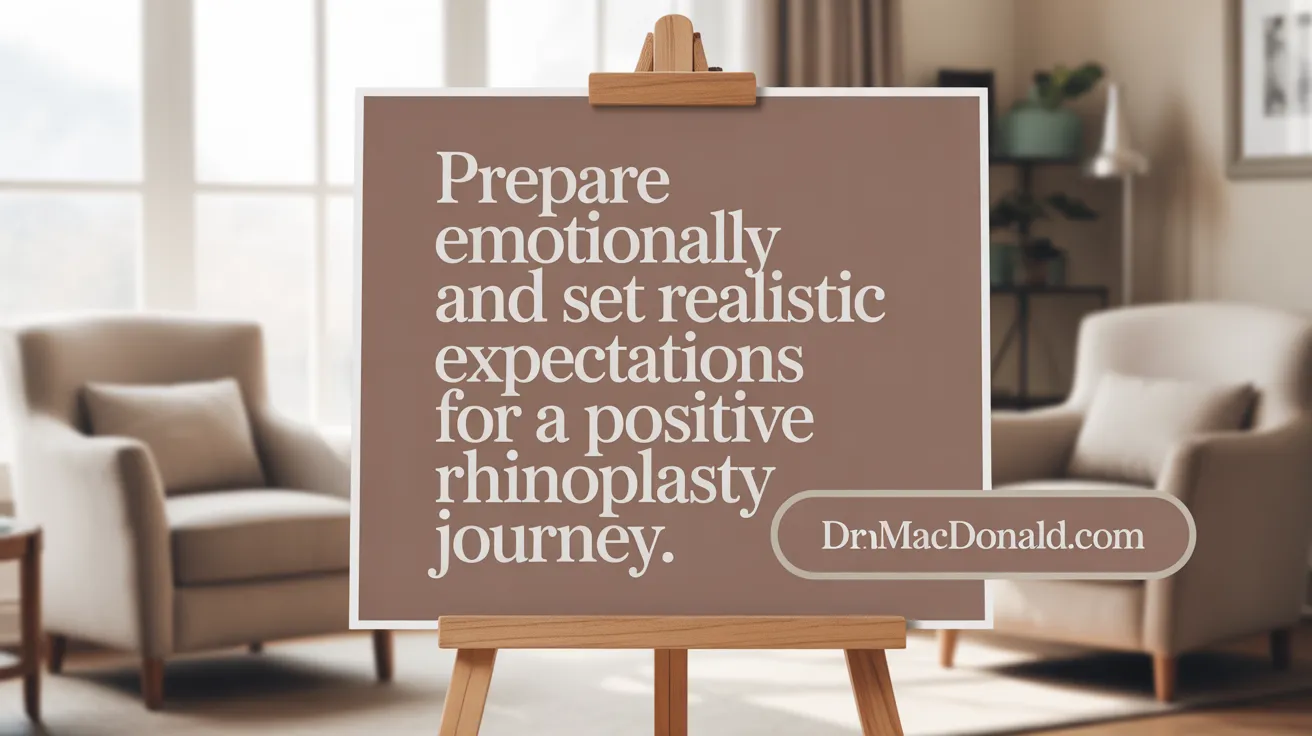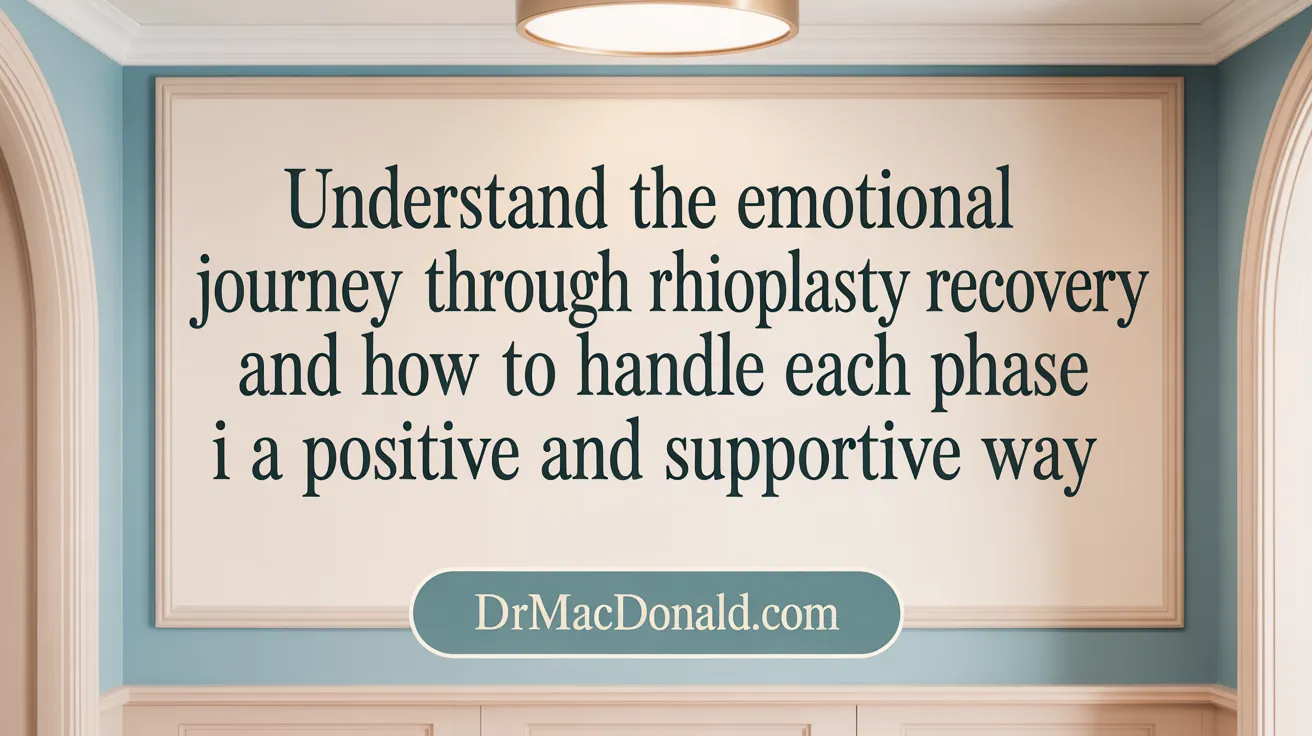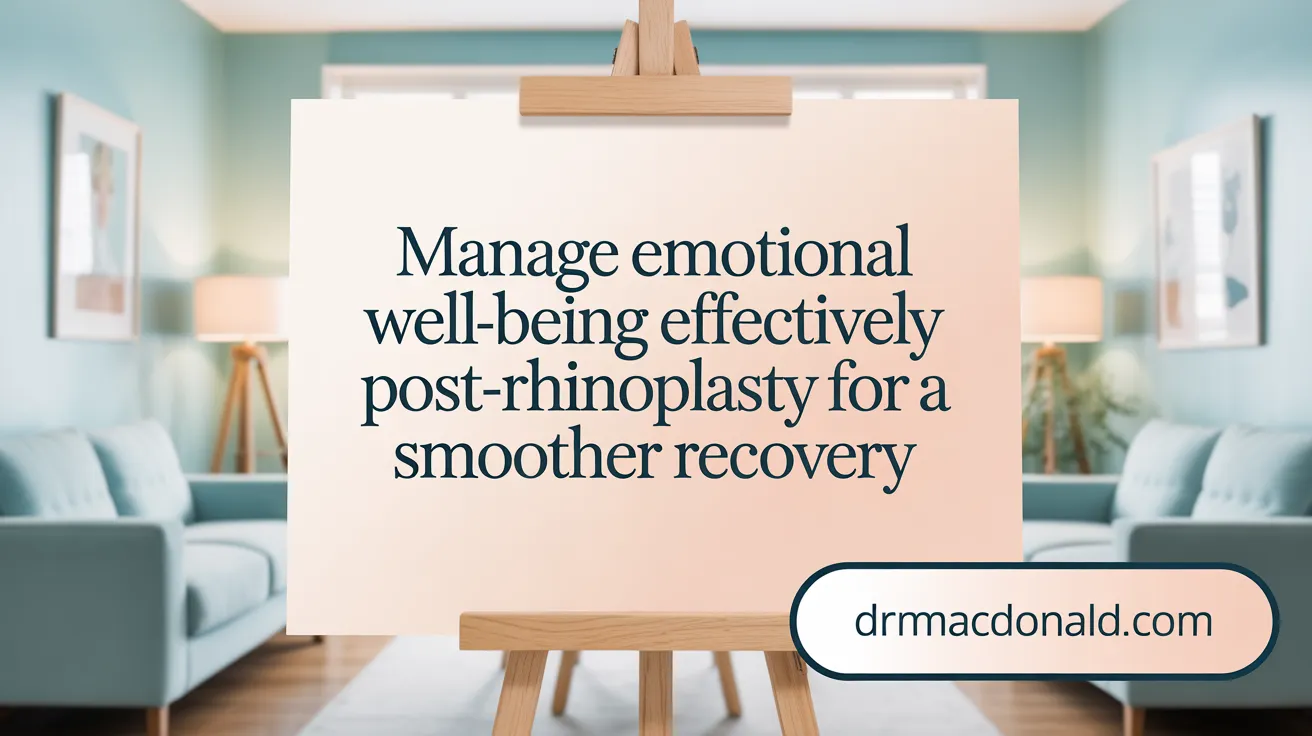Exploring More Than Just Physical Change
Rhinoplasty, commonly known as a nose job, is widely recognized for its cosmetic and functional benefits. Yet, beneath its physical transformation lies a profound emotional and psychological journey that patients navigate before, during, and after surgery. Understanding this journey reveals the complex emotional phases involved—including anticipation, anxiety, self-doubt, and ultimately, self-acceptance—and highlights the critical importance of preparation, support, and realistic expectations. This article delves into the multifaceted emotional experiences of rhinoplasty patients, exploring common challenges and long-term psychological benefits, as well as offering insights for coping with the ups and downs post-surgery.
Emotional Preparation and Setting Realistic Expectations Before Rhinoplasty

How can patients emotionally prepare and set realistic expectations before undergoing rhinoplasty?
Preparing emotionally for rhinoplasty involves several important steps to ensure a positive psychological experience. First, thorough consultations with a qualified surgeon help clarify personal goals and address any concerns. Understanding what can realistically be achieved through surgery allows patients to set achievable expectations, reducing potential dissatisfaction.
Building a strong support system is crucial. Family, friends, or mental health professionals can offer emotional comfort before and after the procedure. Their encouragement and understanding help patients cope with pre-surgery anxiety and post-operative emotional fluctuations.
Practicing relaxation techniques such as meditation, mindfulness, and deep breathing can alleviate stress and foster a calm mindset. Additionally, educating oneself about the procedure, recovery stages, and potential emotional reactions prepares patients to face challenges confidently.
It’s normal to experience emotional shifts like mood swings, frustration due to swelling, or doubts about the results. Recognizing that these feelings are temporary helps in developing effective coping strategies, such as positive self-talk and patience.
Healthy lifestyle choices, including good nutrition, sufficient rest, and avoiding stressors, further bolster emotional resilience. Planning for proper post-operative care and follow-up ensures a smoother recovery, both physically and emotionally.
Overall, emotional readiness combined with realistic expectations enhances satisfaction with outcomes and promotes a healthier mental state during the transformative journey of rhinoplasty.
The Psychological and Emotional Impacts of Rhinoplasty: Beyond Physical Change
 Rhinoplasty does more than just alter the nose's appearance; it can significantly influence a person's emotional well-being and self-perception.
Rhinoplasty does more than just alter the nose's appearance; it can significantly influence a person's emotional well-being and self-perception.
Many patients report boosts in self-esteem and confidence as their new look aligns better with their personal aesthetic goals. This increase in self-assurance often extends to social and professional interactions, making individuals feel more comfortable in a variety of situations. As swelling and healing progress, individuals typically experience a sense of reassurance and pride in their decision, which can translate into an overall improved quality of life.
However, the emotional recovery process involves phases of fluctuation. Initial post-surgery feelings may include emotional highs intertwined with moments of doubt, frustration, or temporary dissatisfaction due to swelling or uneven results. Emotional reactions such as anxiety and excitement are common during this period, emphasizing the need for proper support systems and realistic expectations.
The importance of mental health cannot be overstated; individuals with stable mental health are more likely to adapt positively and enjoy the long-term psychological benefits of rhinoplasty. Maintaining a healthy mindset and seeking psychological support when needed are essential to navigate this transition effectively.
Ultimately, the emotional transformation that accompanies rhinoplasty can lead to greater self-acceptance and a revived sense of identity. Patients often describe feeling more aligned with their self-image and experiencing a newfound confidence in their appearance. This shift not only influences their outer appearance but also fosters a more positive outlook on personal and social levels.
In summary, rhinoplasty can profoundly impact psychological health by improving self-esteem and facilitating emotional growth. Success depends greatly on realistic expectations, emotional resilience, and professional guidance throughout the journey.
How Rhinoplasty Shapes Self-Esteem and Emotional Well-being

How does rhinoplasty affect self-esteem and emotional well-being?
Rhinoplasty, especially when performed for aesthetic reasons, can have a profound impact on a person’s self-esteem and emotional health. Many patients report feeling more confident immediately after surgery, as their appearance aligns more closely with their personal ideals. Studies utilizing Rosenberg’s self-esteem scale often show noticeable improvements in self-worth and body image following rhinoplasty.
This positive change extends beyond physical appearance. Patients frequently experience less social anxiety and greater willingness to participate in social activities, which boosts overall happiness and mental health. The enhancement in self-confidence can lead to better professional and personal relationships.
However, the emotional benefits are strongly linked to having realistic expectations. When patients understand that rhinoplasty is a transformative process that involves gradual healing and that perfect results are unlikely, they tend to cope better with the recovery phase.
Long-term psychological benefits include sustained improvements in body image and self-assurance. Nonetheless, dissatisfaction can still occur if the surgical results do not meet the patient's expectations or if underlying psychological issues are unresolved. Therefore, psychological health and clear communication with a qualified surgeon are crucial for ensuring the best emotional outcomes.
Typical Emotional Phases Experienced During Rhinoplasty Recovery

What emotional phases do patients typically experience during rhinoplasty recovery?
Undergoing rhinoplasty is not just a physical transformation but also an emotional journey. Patients often encounter several distinct emotional stages as they recover from surgery.
Initially, many feel a wave of excitement and relief. This is the adrenaline rush that comes with having taken a step towards improving their facial harmony or breathing issues. During this stage, patients are optimistic and eager to see the final results.
However, as the first signs of swelling and bruising set in, feelings of frustration or anxiety commonly follow. The swelling can temporarily distort the appearance of the nose, leading to disappointment or self-consciousness. This period may also be marked by a sense of impatience, as patience becomes essential to navigate the gradual healing process.
Self-doubt during early healing is also typical. Patients might question whether the outcome will meet their expectations, especially since initial swelling can obscure the final shape. Such feelings are natural but need to be managed carefully.
Throughout the recovery journey, understanding that healing is gradual helps set realistic expectations. Embracing patience is crucial because the nose continues to refine over months, often taking up to a year to reach its final structure.
Support systems, whether from family, friends, or mental health professionals, play a vital role in emotional well-being during this period. Encouragement and reassurance help patients stay positive, building resilience as they look forward to their new appearance.
Ultimately, recognizing these emotional phases and securing emotional support can lead to a more satisfying recovery experience and a confident embrace of the final results.
Addressing Emotional Challenges and Distress Post-Rhinoplasty

What are the common emotional experiences, including distress or depression, associated with rhinoplasty recovery?
Patients undergoing rhinoplasty often encounter a variety of emotional reactions during their healing journey. Initially, feelings of excitement may be intertwined with anxiety and apprehension about the surgery and its outcomes.
Once the procedure is completed, many individuals experience emotional fluctuations such as mood swings, frustration, or even sadness. These feelings are frequently linked to swelling, bruising, and the temporary distortion of appearance, which can cause distress and impact self-esteem.
Dissatisfaction with early results and unmet expectations may lead to disappointment or social withdrawal, especially when swelling conceals the final shape of the nose. Typically, these emotional responses are short-lived and diminish as swelling subsides and the final results become more apparent.
However, it is important to recognize that some individuals, particularly those with preexisting mental health issues, body dysmorphic disorder, or unrealistic expectations, might experience more intense emotional distress or depression. Persistent feelings of sadness, hopelessness, or thoughts of regret should be addressed promptly with professional support.
Understanding that these emotional challenges are normal parts of the healing process can help patients build resilience. Preoperative counseling that includes setting realistic goals and expectations plays a crucial role in managing emotional health.
Seeking support from mental health professionals, family, friends, or support groups during recovery can also provide reassurance and help manage temporary distress. If feelings of depression persist beyond the typical healing period, consulting a healthcare provider is essential to ensure comprehensive care.
In conclusion, emotional reactions during rhinoplasty recovery range from normal fluctuations to more serious distress, and awareness plus support are vital for a positive psychological outcome.
Effective Coping Strategies for Managing Emotional Challenges After Rhinoplasty
What coping strategies can patients implement to manage emotional challenges after rhinoplasty?
Recovering from rhinoplasty involves more than physical healing; it also requires emotional resilience. Patients can use several strategies to navigate the emotional ups and downs during their recovery period.
First, maintaining realistic expectations is essential. Understanding that swelling, bruising, and initial appearance changes are temporary can alleviate frustration. It’s important to recognize that the final results often take up to a year to fully manifest, and patience is a vital part of the process.
Seeking support from loved ones or mental health professionals can provide comfort and reassurance. Friends and family can offer emotional backing, while therapists can help address feelings of anxiety or self-doubt that may surface during recovery.
Engaging in stress-reducing activities such as mindfulness meditation, gentle breathing exercises, or relaxation techniques can support emotional stability. These practices help manage anxiety related to appearance concerns or healing uncertainties.
Open communication with your surgeon is also crucial. Regular follow-up appointments allow you to discuss concerns, understand your healing progress, and receive professional reassurance. Following post-operative instructions meticulously ensures smooth recovery and can prevent complications that might heighten emotional stress.
Incorporating these strategies—setting realistic expectations, leaning on support networks, engaging in calming activities, and maintaining clear communication—can greatly enhance emotional well-being during rhinoplasty recovery. They help patients feel more in control and foster a positive outlook as they progress toward their final, satisfying results.
The Long-Term Psychological Benefits and Emotional Growth Following Rhinoplasty
What are the long-term psychological effects and benefits of rhinoplasty?
Rhinoplasty often extends its positive impact beyond physical appearance, fostering substantial emotional growth and psychological improvements over time. Many patients experience a sustained increase in self-esteem, feeling more confident about their facial harmony and overall body image. This boost in self-confidence can lead to enhanced social interactions, allowing individuals to participate more comfortably in social and professional settings.
Research reveals that reductions in anxiety and neurotic tendencies can endure for years following the procedure. Studies show that up to five years post-surgery, patients report feeling less self-conscious about their nose and more satisfied with their appearance. These internal psychological shifts contribute significantly to a person's overall mental health, encouraging a more positive outlook on life.
While social factors play a role, much of the long-term psychological benefit stems from a genuine internal change in self-perception. Patients often describe their emotional evolution as feeling more authentic, less constrained by previous insecurities. However, it's essential to recognize that not all outcomes are purely positive; some individuals may still grapple with residual psychological issues, underscoring the importance of realistic expectations and appropriate psychological support.
Overall, rhinoplasty can lead to enduring psychological benefits. It can help reduce feelings of insecurity, increase emotional resilience, and promote a healthier self-image. As with any aesthetic procedure, careful patient selection—considering emotional readiness and motivation—is crucial to achieving these long-lasting mental health improvements.
Embracing the Emotional Journey of Rhinoplasty Patients
Rhinoplasty encompasses much more than physical alteration; it invites a complex emotional and psychological journey marked by hope, uncertainty, and growth. Patients embark on this path with a blend of excitement and apprehension, navigating through phases of emotional highs and lows accentuated by the gradual healing process. The key to a positive experience lies in comprehensive emotional preparation, realistic expectations, and the presence of strong support networks. As swelling subsides and final results emerge, many patients find newfound confidence and self-acceptance that enrich their quality of life. Integrating psychological care with surgical expertise ensures patients are resilient not only physically but emotionally, fostering satisfaction that lasts well beyond the operating room. Understanding and honoring this emotional voyage is essential to supporting rhinoplasty patients at every stage of their transformation.
References
- The Psychological Journey of Rhinoplasty - Dr Priya Bansal
- Realistic Rhinoplasty Expectations: A Comprehensive Guide
- The Impact of Rhinoplasty on Self-Esteem - EKOL HOSPITALS
- Managing the Emotional Journey of Rhinoplasty: Key Insights
- The Emotional Journey Of Plastic Surgery Patients
- The Emotional and Mental Side of Rhinoplasty - Made of Lovely
- Emotional Impact of Nose Change | Sean Weiss, MD New Orleans
- The Psychological Impact of Rhinoplasty on Self-Esteem - Evoclinic
- Rhinoplasty Recovery: A Comprehensive Timeline and What to Expect
